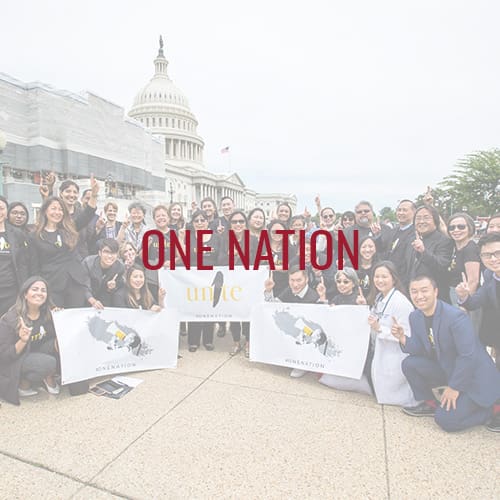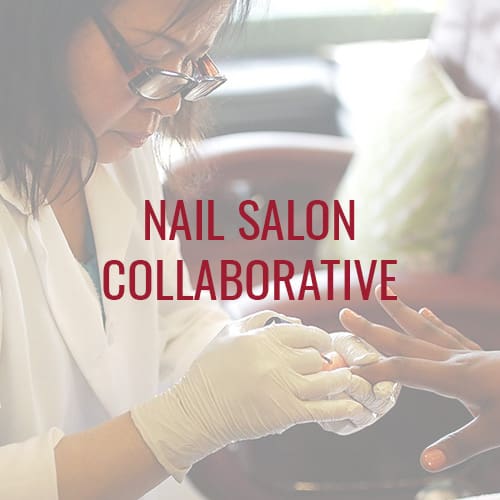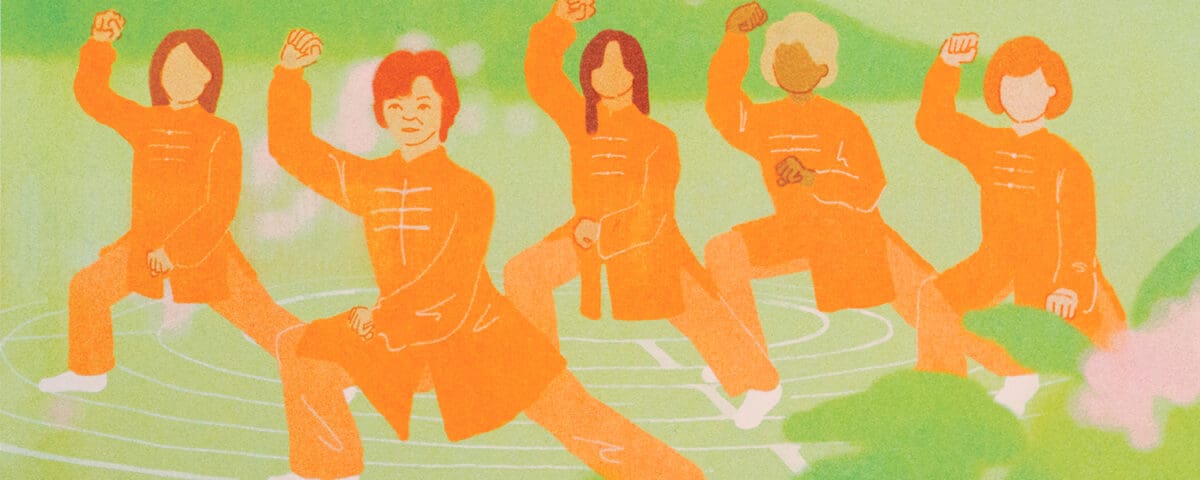
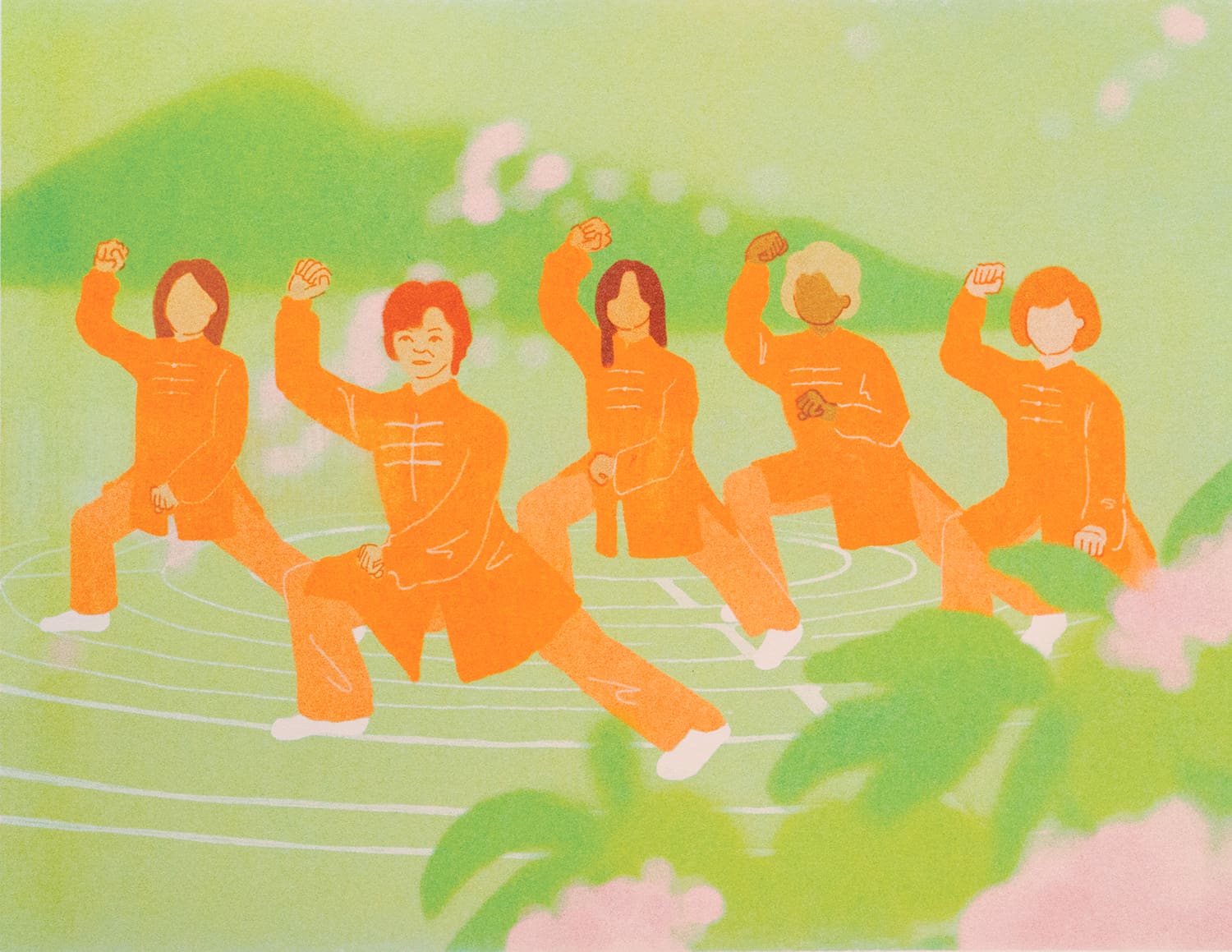
Hai Yan
Tai chi has been central to Hai Yan’s life since her childhood in Foshan, China. Now living in Oakland, it has become her way of connecting with people across cultures and bridging the two worlds she calls home.
ROOTS & BEGINNINGS
Interviewer: 您在何时何地出生?
When and where were you born?
Hai Yan: 我于1947年在广东省佛山市出生,1991年移民到美国,一直居住在屋仑。现在我已经退休了。
I was born in 1947 in Guangdong Province in a city called Foshan. I came to the US in 1991. I have always lived in Oakland. I am now retired.
Interviewer: 在佛山长大是什么样的经历?
What was it like growing up in Foshan?
Hai Yan: 佛山有很多社区活动场所,例如黄飞鸿武术文化中心和其他几个武术馆。佛山是武术之乡。锻炼是我们日常生活的一部分。我们每天早上六点起床,到公园练习太极和其他武术。The city has many community places. It has a Wong Fei Hung martial arts cultural center, and several other martial arts centers. Fat Saan is home to martial arts practices. Exercise was part of our daily lives. We wake up every morning at 6am and go to the park to practice Tai Chi and other martial arts.
Hai Yan: 佛山人早上起来不会立刻去喝早茶,他们注重健康,会先去公园锻炼、练习太极。所以我来美国之前,已经养成了这种每天锻炼的习惯,也学会了各种太极拳套路,后来到美国也延续下去。
Foshan people don’t go have dim sum when they first wake up. They go exercise and do tai chi at the park for health. So before I came to the US, I developed this daily ritual and tai chi forms and practice which I later brought to the US.
Hai Yan: 我小时候到处骑自行车。在佛山,我们一家六口一起吃饭、一起睡觉。佛山不像广州那么大,它融合了城市和乡村生活,沿着河岸种菜养鱼。那里的食物很美味。
I grew up riding a bicycle everywhere during my childhood. In Foshan our family of 6 would eat together and go to sleep at the same time. It was a city that is not as big as Guangzhou. It had a mix of city life with rural life along the river growing food and fish. It had great food.
Interviewer: 您的移民经历是怎样的?有没有遇到什么困难?What was that experience like for you? Challenges?
Hai Yan: 我弟弟在1985年先移民美国,然后担保我父母过来。当时,他们很喜欢这里的生活质量。当时屋仑的治安和公共设施都比现在好。于是他们又担保我们剩下的孩子,在1991年一起移民过来。
My younger brother came to the U.S. first in 1985 who then sponsored my parents to come. At the time, they enjoyed the quality of life here – public safety and amenities were better in Oakland back then. So they sponsored the rest of us children in 1991.
Hai Yan: 我还记得我们到达旧金山国际机场那天晚上,全家第一次一起吃晚饭,是在百老汇的翡翠轩餐厅。我对翡翠轩的第一印象是,虽然它被称为酒家,但相比我在佛山去过的那些,它显得小很多。
The night we landed in SFO, I remember my first memory was our first family dinner together at Jade Villa Restaurant on Broadway. My first impression was that Jade Villa was called a banquet restaurant, but it felt small compared to the banquet restaurants I went to in Foshan.
Hai Yan: 刚来美国时不会说英语,生活一开始很难适应。但我在屋仑华埠找到一个文化熟悉的地方住下来,帮助很大。我在第七街和富兰克林街交界的金殿楼上租了一个单位,第一周就在楼下的面包店找到了一份工作。我每天早上五点开始工作,一直到晚上六点。我在那里工作了两年。离开面包店之后,我又在第七街的一家工厂工作,负责组装电路板。后来那家工厂搬到了旧金山,我也跟着过去,继续工作了将近15年。
It was hard to adjust to life in the US at first not knowing English, but it helped to find a culturally familiar place to live in Oakland Chinatown. I rented a unit upstairs in the Legendary Palace building on 7th and Franklin, and found a job after the first week at a bakery downstairs. I would work at 5am until 6pm each day. I worked there for 2 years. After leaving the bakery, I worked at a factory on 7th Street, putting together circuit boards. It later moved to San Francisco, where I continued to work for almost 15 years.
Community
Interviewer:
您在哪里找到了归属感或可以融入的社群?
Where did you find a community?
Hai Yan: 海燕: 我每周有一天休息,那一天我都会去麦迪逊公园练习太极。每天早上那里都有几百人在做运动。以前公园里还没有一块铺设好的区域。我会教我在佛山学过的太极套路,包括24式、42式、48式太极拳,以及32式和42式太极剑——这些都是竞赛套路。我也会教双扇和单扇。直到今天,我仍然在社区里教太极。我很自豪能分享这些我从佛山带来的武术套路。
I had one day off each week and would go do Tai Chi at Madison Park on that day. There would be a few hundred people exercising there each morning. The park used to not have a single paved area. I would teach different forms of Tai chi that I learned in Foshan, including 24, 42, 48 form in Tai Chi and 32 and 42 sword form – all competitive forms. And also would do double and single fan style. Until this day, I still teach tai chi to others in the community. I am proud to be able to share these martial arts forms that I brought over from Foshan.
Hai Yan:
我们表演时会穿特别的服装。随着我们的太极社群不断壮大,我成立了一个特别的太极之友群组,每年十二月,我们都会在中餐馆一起庆祝。我们的太极社群,为我们这些新老移民带来了深刻的归属感。人们通过口耳相传加入。我还有照片可以分享!我们甚至参加了本地的比赛,并赢得了奖杯!我们的团体叫做“健身之友”。
We would wear special outfits for performance. As our tai chi community grew, I created a special group of tai chi friends to celebrate each December at a Chinese restaurant. Our tai chi community creates a deep feeling of togetherness for us, old and new. Folks join the group through word of mouth. I have photos to share! We even entered local competitions and won trophies! Our group is called “Exercise Friends”.
Hai Yan: 这些年来,我努力扩大我们的太极社群,与不同文化背景的朋友。分享我们的太极练习。除了华人,我还教过白人和黑人。我甚至在公园里帮助并结交了一位无家可归的朋友。我们是一个移民国家,屋仑有许多不同的文化。我们应该互相包容、互相帮助,团结起来。
Over the years, I try to build community with all types of people and share our tai chi practice with people of other cultures. Besides Chinese community members, I’ve taught tai chi to people of all backgrounds. I’ve helped and befriended a houseless man too at the park. We are a of different backgrounds and there are many kinds of cultures represented here in Oakland. We should embrace and help each other, and build unity.
AHS + HEALTH
Interviewer: 为什么亚健社(AHS)及其语言无障碍服务,对你来说很重要?
Why is AHS and their cultural understanding important to you?
Hai Yan:
我们家四代人都受益于亚健社。我妈妈、我自己、我的孩子、我的祖父母,都曾在亚健社接受医疗服务。我妈妈最先移民过来时住在华埠,很快就找到了亚健社。亚健社的位置很方便,就在华埠,而且医生和护士都能说粤语,所以我们不需要依赖翻译,非常方便。那里的员工都非常有爱心。
Four generations of my family have benefitted from AHS. My mom, me, my kids, my grandparents all have been patients. When my mother immigrated first, she lived in Chinatown and immediately found AHS. It is conveniently located in Chinatown, and the doctors and nurses speak Cantonese with you. So it’s very convenient for us to not to have to rely on interpreters. They are very caring.
Hai Yan:我可以分享一些例子。第一,我妈妈曾经得了重病,亚健社的医生诊断后迅速采取行动,挽救了她的生命。第二,我的孙子孙女很怕打针,但那里的护士和医生都能很好地安抚他们,他们的细心照顾缓解了孩子们的焦虑。亚健社真的是一个宝藏。他们的地点很好,员工也很好。而且他们有自家药房,对我们来说非常方便。
There are examples that I can share. First, my mom had a serious illness. The doctor at AHS diagnosed it and acted quicky. They saved my mother’s life. Secondly, my grandchildren are very afraid of shots. However, the nurses and doctors have been very calming to them. Their care helped eased their anxiety. AHS is a treasure. The locations I great. The staff are great. Also, their in-house pharmacy makes it very convenient for us.
Interviewer: 对你来说,健康意味着什么?
What does good health mean to you?
Hai Yan: 对我来说,健康是全面的。它包括一个良好的环境、有开放空间、安全的住房、朋友的陪伴、健康充足的食物、日常锻炼,以及在社群中一起享受文化活动。而且,走路非常重要。我非常喜欢走路,每天都会绕梅利湖走半圈。
For me, good health is holistic. It includes a healthy environment with lots of open space, safe housing, friendships, healthy and adequate food, daily exercise, and enjoying cultural practices together in community. Also, walking is very important. I really enjoy walking, and I walk half of Lake Merritt everyday.
Interviewer: 您是如何开始在亚健社做志愿者的?
How did you get to volunteer at AHS?
Hai Yan: 我一开始是通过朋友认识了一个非营利组织,叫“亚裔移民妇女促进社”(AIWA)。那里的人把我介绍给了亚健社,并推荐我参与他们的病人领袖项目。我很珍惜自己在华埠社区的志愿工作,也很乐于帮助其他移民过上健康和充满活力的生活。我很高兴能向其他移民推荐亚健社出色的服务,并看到他们蓬勃发展。
I got connected to a nonprofit organization called AIWA first through friends. Folks there connected me to AHS and their patient leadership opportunities. I value my volunteer work in the Chinatown community and am happy to help other individuals thrive and be healthy. I enjoy referring other people to their excellent services and seeing them thrive.
Interviewer: 你会给别人什么健康建议?
What advice would you give to others on maintaining good health?
Hai Yan:
如果可以的话,每天都锻炼身体和练习太极。不只是太极本身,更重要的是和朋友们一起练习太极。太极的社交和文化层面,可以帮助老年人避免社交孤立。
Exercise and practice Tai Chi every day if you can. Not just Tai Chi, but practicing tai chi together with friends is vital. The social and cultural aspect of Tai Chi helps keep elders from becoming socially isolated.
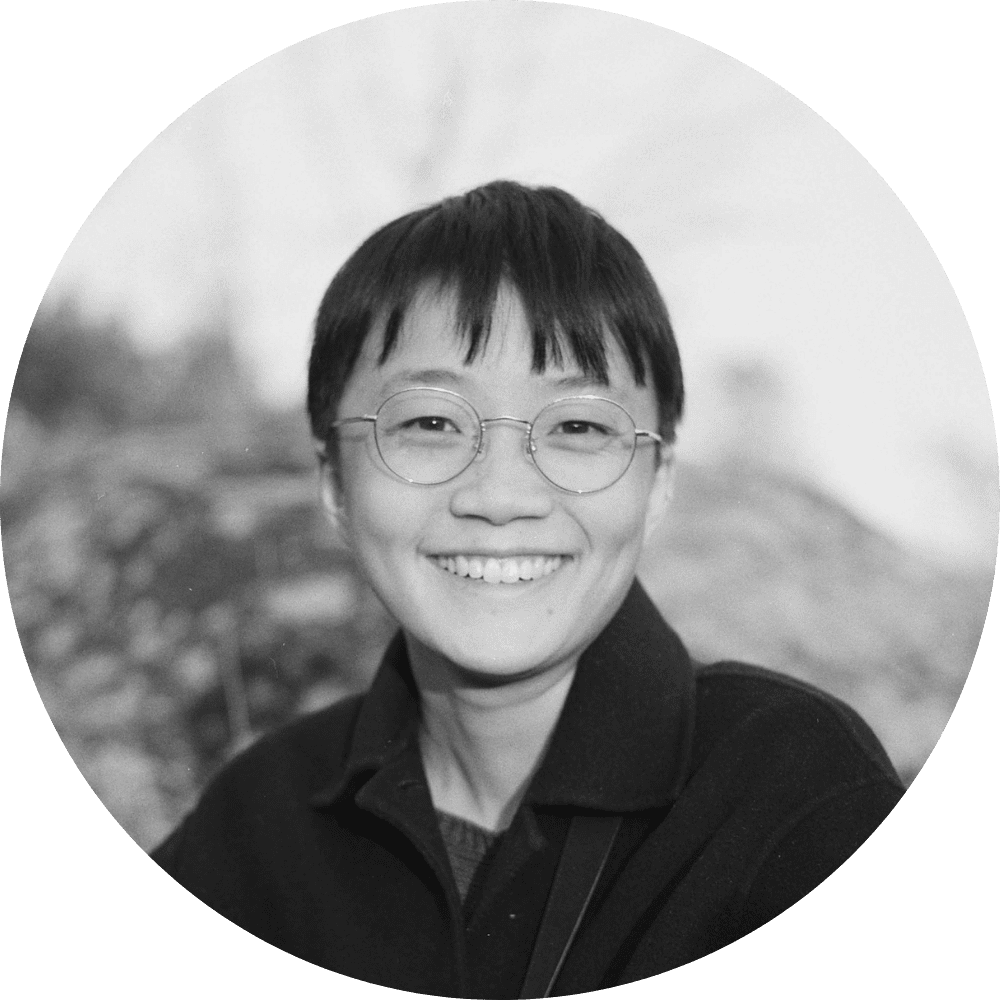
Chloe Ng
Chloe Ng is a Cantonese American designer who enjoys the tactile artistry of print.

